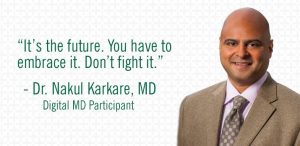A new delivery system and a new technology, both gaining favor in healthcare circles, may come together to alter the way healthcare is dispersed and how physicians are reimbursed.
Value based healthcare (VBH) is the delivery system being adopted by many insurers as well as the U.S. government. The Department of Health and Human Services, for example, plans to move 50% of Medicare payments to the value-based model in 2018. Similarly, by 2020, insurer Aetna plans to have 75% of its payments going to providers and facilities practicing VBH.
In value-based care, the focus is on outcomes as opposed to services rendered. Providers’ reimbursements are based on the health of the patient, which is determined by criteria such as a reduction in the number of hospital readmissions and effective use of preventative care.
The technology creating a stir is called blockchain, a digital ledger that records transactions in encrypted form. Each transaction, or iteration of a transaction, becomes a block in a chain. The blockchain is decentralized – no third party such as an insurance company or hospital maintains it. Only the owner – in this case, the patient – and members of their network can access the files.
Once stored, the files cannot be altered, even by a member of the network, which protects the data’s integrity. This also ensures that a patient, provider or insurer knows that they are accessing current information.
“If you have a blockchain-based mechanism, there’s no question about which dataset is most up-to-date or what the patient has approved. It puts the patient in the middle, which is exactly what value-based care is about,” said Shahram Ebadollahi, Vice President for Innovations and Chief Science Officer at IBM Watson Health, in an interview with Health IT Analytics.
IBM is expressing a great deal of enthusiasm for blockchain, as evidenced by its partnership with the Food and Drug Administration to study using blockchain to transfer data from wearables and other items in the Internet of Medical Things (IoMT).
Advocates of value-based healthcare assert that it will lower costs, increase patient satisfaction, reduce medical errors and promote healthy habits.
“The benefits of a value-based healthcare system extend to patients, providers, payers, suppliers, and society as a whole,” according to an editorial in the New England Journal of Medicine, which listed these benefits of VBH:
- Patients spend less for better health: VBH focuses on speedy recovery from illness and injury, and the avoidance of chronic disease. This translates to fewer doctor visits, tests, medications and procedures.
- Providers achieve efficiencies and greater patient satisfaction: While providers may need to spend more time on new, prevention-based patient services, they will spend less time on chronic disease management, which will increase overall quality of service and patient engagement.
- Payers control costs and reduce risk: VBH is expected to greatly reduce overall healthcare costs, thanks to risk being spread across a larger population and its focus on preventative care.
Blockchain advocates say that it facilitates VBH benefits in the following ways:
- Having one set of electronic health records (EHRs) in a blockchain, as opposed to several sets dispersed among providers and insurers, decreases the possibility of unnecessary tests, procedures and prescriptions.
- Having access to EHRs that clearly are the most current can help providers stay on top of a patient’s health, meaning more preventative care and less chronic disease management.
- Centrally located EHRs cut down on billing errors and streamline administrative processes.
However, even proponents of VBH and blockchain believe a slow integration of these concepts will work best.
VBH is “a behavioral challenge,” according to an article from the Henderson Institute, a division of Boston Consulting Group promoting business innovation. This will prove a major challenge in healthcare, with its multiple specialties and stakeholders, all with sets of sometimes conflicting measures of success.
The application of blockchain also will have to be slow and steady to be successful, according to John Bass, CEO of Hashed Health, an association of healthcare companies promoting the use of blockchain.
Only a small group of developers are offering healthcare-focused products related to blockchain, and few case studies are available to establish blockchain’s ability to be applied in different-sized healthcare settings.
“Everyone is very excited about the disruptive potential of blockchain, but we don’t want to get lost in the hype,” Bass said in the Health IT Analytics article. “If we want to prove it can make a real difference, we need to anchor the industry with some simple demonstrations of value.”
Simplicity may be the attribute that makes both VBH and blockchain irresistible to providers, patients and other healthcare stakeholders. Both concepts are aimed at unraveling the knots of a labyrinthine healthcare system to make it more effective for patients as well as its other stakeholders.




